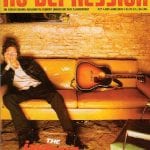Todd Snider – Don’t hurry, be happy
For much of his 33 years, Todd Snider has been in almost constant motion. Born in Portland, Oregon, Snider called Northern California, Texas, Atlanta and Memphis home before settling recently in Nashville. Likewise, his music has generally had no fixed address; the lanky singer-songwriter’s work has reflected his various locales, with ample helpings of introspective folkiness, wise-guy novelty romps, heartland rock, alt-country shuffles, folk-rock, Southern boogie and hip-shaking R&B.
In Memphis, Snider was mentored and championed by Keith Sykes, a member of Jimmy Buffet’s Coral Reefer Band and an accomplished songwriter in his own right. Sykes helped Snider land a deal on MCA’s Margaritaville imprint.
Songs For The Daily Planet, Snider’s 1994 debut, introduced a brash young talent with a gift for wickedly funny wordplay, most notably in the slyly prescient grunge kiss-off, “Talkin’ Seattle Grunge Rock Blues”. Critical acclaim and a fair-to-middlin’ radio buzz sent Snider and his band, the Nervous Wrecks, out on the road for nearly nonstop touring, with breaks taken to record 1996’s Step Right Up and 1998’s Viva Satellite.
Snider and band were finally rounding into the kind of sound they’d been searching for when flagging sales put the kibosh on the MCA deal, effectively pulling the plug on the band. Snider was quickly picked up by John Prine’s Oh Boy label and almost immediately began retooling himself into an acoustic-oriented singer-songwriter, more in the traditional folk mode. That’s a relative assessment, though; the rapid-firing, slightly-unglued Snider is still light years away from your garden-variety coffeehouse troubadour.
In many ways, 1999 was a landmark year for Snider. After years careening on the road as a single guy in a rock ‘n’ roll band, he fell in love and got married (to “fictional portrait” artist Melita), moved to Nashville, and recorded his fourth album with producer Ray Kennedy at Room And Board Studios.
Happy To Be Here was released April 18 on Oh Boy. Fans of Snider’s previous records will have no trouble recognizing him here, but the sound and the arrangements are, for the most part, simpler and more organic than previous efforts. All the cuts were written by Snider except “Betty Was Black (And Willie Was White)”, a tune from the catalog of Will Kimbrough and Tommy Womack’s former band, the Bis-quits.
Anchored by Snider’s voice, acoustic guitar and occasional harmonica, the songs put more emphasis on the entire lyric than on catchy verses or band-driven grooves. Even with well-chosen help from NRBQ’s Joey Spampinato, the Memphis Horns’ Wayne Jackson, the Continental Drifters’ Peter Holsapple, longtime Snider sidekick Kimbrough, and a dizzying tap-dance solo by Kim Richey, the overall sonic impression is refreshingly lean and spare.
Most significant of all, though, is the fact that Snider has tapered off his usual third-person distance and shoot-from-the-hip glibness to dig within himself for some meaty, autobiographical insights that bring the songs front-and-center.
“Long Year”, for example, ostensibly burrows into the almost-fashionable self-retrieval and wagon-circling of “twelve-stepping,” but could just as easily be referring to Snider’s own early adult choice to forgo the workaday world and embark upon the shaky, bare-nerved life of a traveling musician. Likewise, “D.B. Cooper” jumps longingly into the escapism of that enigmatic, parachuting, modern-day Jesse James, all the while couched in the boozy, junk-band Americana exemplified by The Band. And while the queasy, paranoid pre-nup rant of “Just In Case” is doubtless an exaggerated caricature, it does reflect the worst terrors of incipient marriage.
In every case, Snider and company have stripped away the sonic trappings of modern pop and rock in favor of time-tested roots maneuvers; the singer has clearly abandoned the last vestiges of youthful star-grubbing in favor of staking out a more substantial claim.
“The person that got me started was Jerry Jeff Walker,” Snider says. “I mean, when I was a kid I liked Creedence and Country Joe McDonald, and Lynyrd Skynyrd was my favorite band growin’ up. But I moved from Portland to Santa Rosa, then to Austin, and there a friend of mine took me to see Jerry Jeff play at a place called Gruene Hall.
“He was playing by himself. He sang songs about living in a bunch of towns and getting by without any money, you know; that was his rap. And I said, ‘Hey, I can do that — I’ve lived in a bunch of towns, and I don’t have any money!'”
Walker’s performance redirected Snider’s musical plans. “Up until then, I’d always kinda fantasized about being in a band,” he explains. “I’d played harmonica in San Francisco and wanted to hook up with a band and be, like, the harmonica player/singer. But that night — I was 18 — I decided at that show that I wanted to be a folk singer; it felt like what I could do. I went right out and bought an acoustic guitar the next day.
“I knew a chord or two, and then I practiced every day for about six months. Literally, within six or seven months, that was my job. I bussed tables during that time, but the only job I’ve had since then is singing. At first, I really just knew three or four chords, and I was just hustlin’ those shows. I didn’t make much money, of course, but I didn’t really want much. I just didn’t wanna have another job.”




